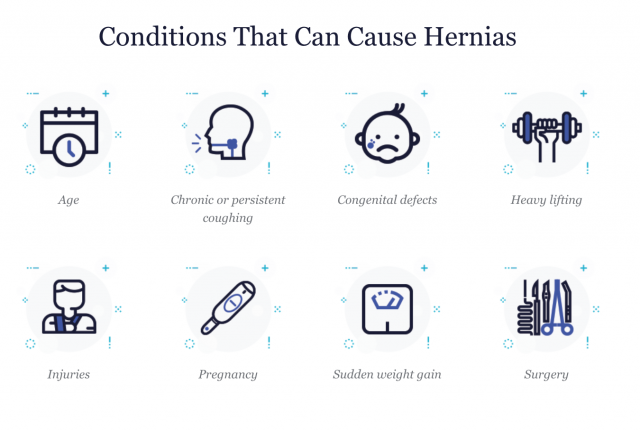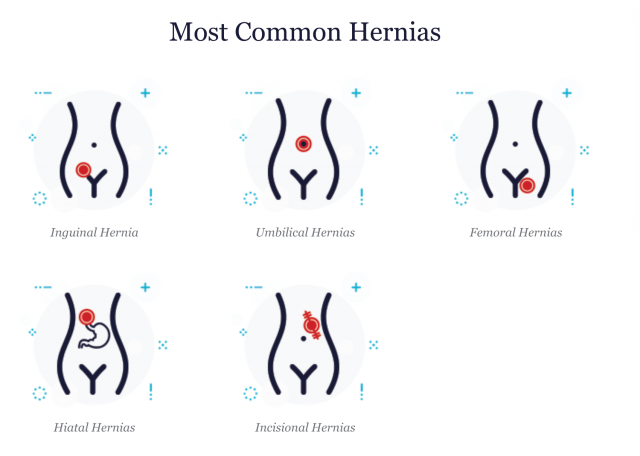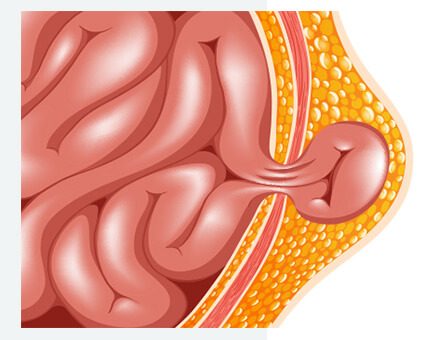Hernias
Hernias happen when part of an organ bulges through a wall of tissue in the body. Doctors diagnose most hernias with a simple physical examination. Signs of a hernia include pain in the abdomen, testicle or pelvic region. Sudden weight gain, chronic coughing and heavy lifting can contribute to a hernia developing. People can prevent hernias by controlling coughing, avoiding muscle strain and losing weight. You should see a doctor before a hernia becomes serious. Surgery is the only way to permanently repair a hernia.
Hernias are tears in tissue that internal organs slip through. Hernias can be painful, but some people with hernias may not experience symptoms.
Doctors can diagnose hernias with physical exams in most cases. Many patients will realize they have a hernia because of the characteristic bulge.
Hernia repair is one of the most frequent surgeries performed in the U.S. There are more than 1 million hernia repairs each year. About 900,000 of those procedures use hernia mesh.
What Causes Hernias?
A combination of muscle weakness and tears cause hernias. Hernias may happen suddenly or develop slowly over a long time.

Am I at Risk?
Hernias are one of the most common anatomical conditions people suffer. The chance of someone having a hernia at some point in their life is about 10 percent. The likelihood is higher for men (27 percent) than for women (3 percent). Obesity plays a role in developing and treating hernias. So does smoking.
Tips for Prevention
Coughing, body weight and strain on the body all help cause hernias. Addressing these can help prevent hernias.
- Control coughing
- Treating persistent coughs can help prevent hernias. Smoking can increase hernia risk because of the coughing it causes. Quitting or avoiding the habit can reduce hernia risk.
- Avoid muscle strain
- Lift heavy objects with the knees, never with the back. People should avoid trying to lift any weight too heavy for them.
- Lose weight
- Excess body fat can strain muscle tissue. Maintaining a healthy weight can cut strain.
Signs of a Hernia
People who suffer a hernia may not experience signs that something is wrong. Pain is the most likely symptom someone with a hernia experiences. Different types of hernias may share certain symptoms. But some symptoms may be unique to a particular type of hernia.
- Pain in the abdomen, testicle or pelvic region
- Abdominal discomfort
- Distended abdomen
- Discomfort or tenderness in the groin
When to See a Doctor
People should seek medical attention before a hernia becomes serious. In some cases, the intestines can become trapped in the hernia. This can cut off blood flow. If this happens, a surgeon may have to remove part of the intestines.
- A painful hernia that cannot be easily pushed back into the abdomen
- A hernia that turns red, purple, dark or discolored
- Inability to pass gas or have bowel movements
Diagnosis
Doctors diagnose most hernias with a physical examination. Patients often sense that they have a hernia on their own.
The most obvious sign is a bump under the skin at the hernia site. This can show up even if a person experiences no other hernia symptoms.
A doctor may use X-rays to diagnose a hiatal hernia or to look for bowel obstructions. An ultrasound can help diagnose umbilical hernias in children and femoral hernias in adults.
Common Hernia Types
There are several types of hernias. Inguinal and umbilical hernias account for most of them. Symptoms can vary based on type and location in the body.

What Is an Inguinal Hernia?
Inguinal hernias happen in the groin. The intestine or bladder juts through the abdominal wall. Inguinal hernias are the most common type of hernia. They are more common in men. About 1 in 4 men (27 percent) will have one in their lifetime, according to the National Institute of Diabetes and Digestive Kidney Diseases. Not all people with inguinal hernias experience symptoms.
- Burning, aching or a sensation of heaviness or weakness in the groin
- Pain when coughing or during physical exertion
- Swelling of the scrotum in men or boys
Types
There are two types of inguinal hernias: Direct and indirect. A doctor can determine which one a patient may have. If these hernias get worse, they may turn into incarcerated or strangulated hernias.
- Direct Inguinal Hernia
- Caused by a weakness in the abdominal wall that occurs over time, usually from repeated heavy lifting or straining. These hernias almost always occur in adult males.
- Indirect Inguinal Hernia
- Caused by abdominal wall defects present during birth. These hernias may occur in infants, but some people born with this defect might not have a hernia for many years.
Incarcerated and Strangulated Inguinal Hernias
Incarcerated hernias occur when tissues or organs from a direct or indirect hernia get stuck outside the abdominal wall. Incarcerated hernias can turn into strangulated hernias.
Strangulated hernias occur when the abdominal wall traps and squeezes internal organs, cutting off blood flow. This can cut off blood flow in the small intestine or cause bowel blockages.
Strangulated hernias require emergency surgery.

What Is an Umbilical Hernia?
Umbilical hernias are most common in infants. They can sometimes heal themselves by the time the child turns 4. But they require surgery if they happen in adults.
- Most often painless
- Swelling over the belly button that bulges when the baby cries, strains or sits up
- Bulge may flatten if the baby lies on its back or is quiet
Umbilical hernias form around the navel. These happen when muscle around the belly button does not close after birth. Organs push through the abdominal lining around the navel. Umbilical hernias appear as an outward bulge.
Umbilical hernias are very small. They range from less than one-third of an inch to about two inches wide. People with an umbilical hernia may never notice they have one. Doctors or other health care workers are most likely to discover them in patients.
Umbilical Hernia in Adults
While most common in children, umbilical hernias still occur in adults. About one in 10 adult abdominal hernias are umbilical hernias, according to the American College of Surgeons. For adults, umbilical hernias can be far more serious.
An umbilical hernia squeezing the intestine can cause a medical emergency. Adults may experience sudden pain and vomiting. It requires immediate surgery.
- Visible bulge on the abdomen
- Bulge is more prominent when coughing or straining
- Pain or pressure at the hernia site
What Is a Hiatal Hernia?
Hiatal hernias occur when part of the upper stomach presses into the chest. The exact cause of these hernias is unknown, but it may be due to weakness in the diaphragm.
The diaphragm is the sheet of muscle dividing the chest from the abdomen. Hiatal hernias are common and the risk of developing one increases as a person ages.
Most hiatal hernias occur in people older than 50, but some children are born with them.
By themselves, hiatal hernias seldom cause symptoms. But people who suffer them may experience pain and discomfort. This is from stomach acid, bile or even air flowing upward from the stomach into the esophagus.
- Chest pain
- Heartburn that gets worse when bent over or lying down
- Difficulty swallowing
What Are My Treatment Options?
Hernia treatments depend on the hernia’s severity and the patient’s pain.
- Monitoring
- It is possible to live with some hernias. Doctors may suggest “watchful waiting.” The doctor and patient watch a hernia to make sure it does not get worse. There is a strangulation risk. The hernia may squeeze the intestine. If this happens, a surgeon may have to remove part of the intestine.
- Diet and Lifestyle
- Losing weight or stopping smoking may prevent a hernia from getting worse. These can reduce strain from extra weight or persistent coughing. Dietary changes can also treat hiatal hernia symptoms.
- Medication
- Doctors may recommend medicines to treat hiatal hernias. Medications include proton pump inhibitors (PPIs) to control stomach acid. These can present their own complications. If medication alone cannot relieve a hiatal hernia, a patient may need surgery.
- Surgery
- Surgery is the only permanent fix for a hernia. Doctors recommend surgery if the hernia gets larger or a patient is in pain.
Hernia Surgery
There are two main types of hernia surgery: open and laparoscopic.
Open surgery involves cutting into the layers of skin and other tissue around the hernia.
Laparoscopic is a minimally-invasive technique. A doctor makes small incisions in the area around the hernia. The doctor inserts medical instruments through these incisions to perform the surgery.
Surgeons can repair hernias using pure-tissue techniques or hernia mesh.
Pure-tissue techniques involve suturing together the damaged tissue. Sometimes this will include different layers of tissue.
Most hernia surgeries in the U.S. rely on hernia mesh. Hernia mesh surgery may involve either an open or laparoscopic method. A surgeon places the mesh around the hernia. He attaches it using surgical staples, tacks or sutures. Over time, tissue grows into the mesh’s holes. This adds strength to the repair.
Recurrence was the most common complication before the hernia mesh’s invention. Research is mixed on how long a mesh hernia repair will last. A 2022 study followed 100 patients for ten years after a ventral abdominal hernia repair.
No recurrence was recorded after three years, while about 10% had a recurrence after roughly eight years. Two patients had a central breakdown of the mesh at about seven years. Mesh had stretched across the defect by an average of 21%. Mechanical testing showed that the mesh lost its elasticity at low forces.
Calling this number connects you with a Drugwatch.com representative. We will direct you to one of our trusted legal partners for a free case review.
Drugwatch.com's trusted legal partners support the organization's mission to keep people safe from dangerous drugs and medical devices. For more information, visit our partners page.

